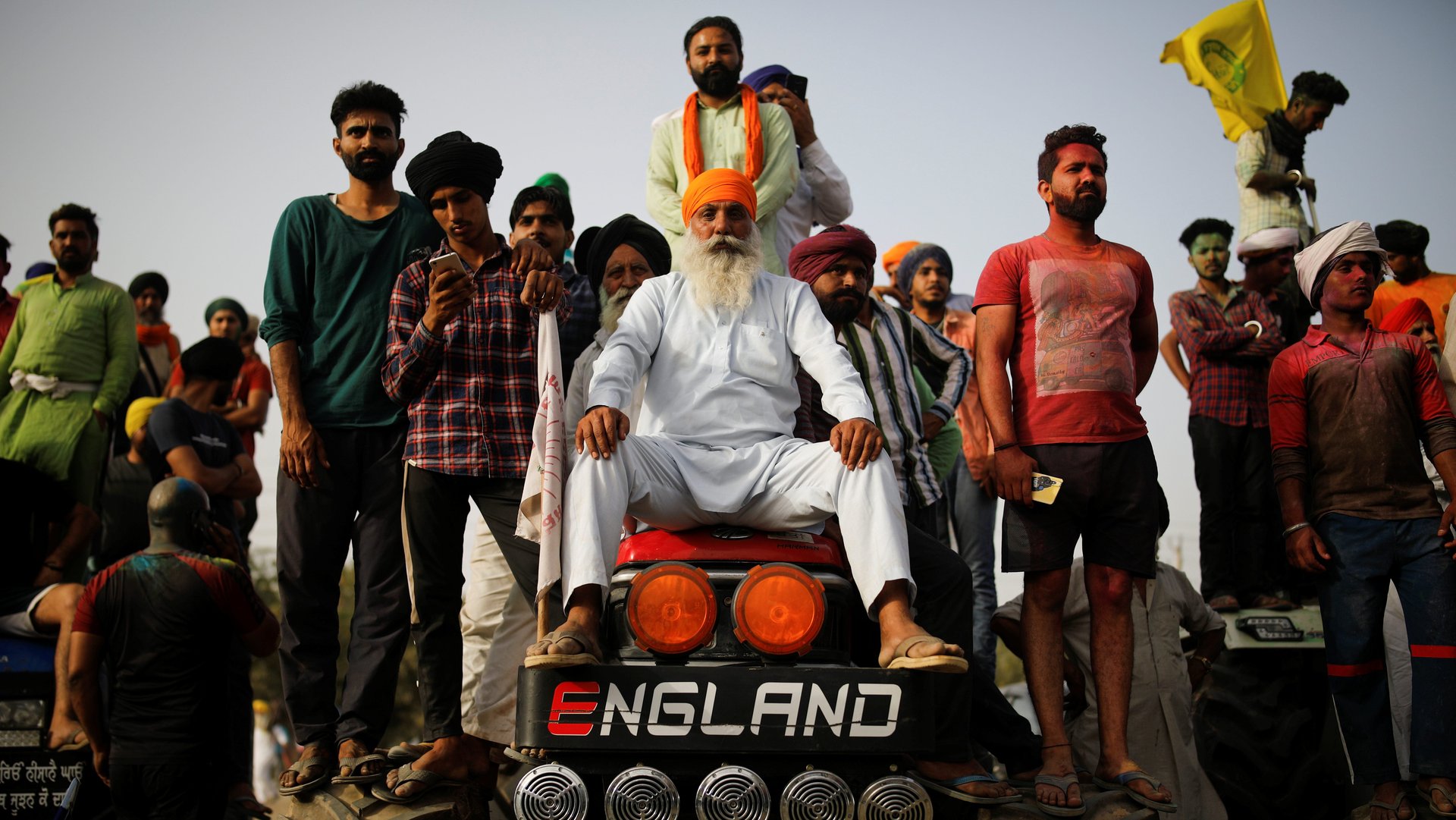The twists and turns that forced Modi’s U-turn on controversial farm laws
Prime minister Narendra Modi’s decision today (Nov. 19) to repeal three controversial farm laws is a culmination of a year-long protest by farmers, with several twists and turns, including a tragic loss of lives.


Prime minister Narendra Modi’s decision today (Nov. 19) to repeal three controversial farm laws is a culmination of a year-long protest by farmers, with several twists and turns, including a tragic loss of lives.
Since November 2020, thousands of farmers, mainly from Punjab, Haryana, and western Uttar Pradesh, have been protesting against the alleged attempt to undermine their autonomy and financial security as cultivators.
Having been dubbed “traitors” and endured inhumane treatment by their own government, the protesters have braved extreme weather and the pandemic, among other crises.
Now, with a victory on their horizon, this may be the time to look back at the trajectory their protest took over the past year.
Against Mukesh Ambani, Gautam Adani
Since the beginning, the farmers have accused the Modi government of favouring businessmen like Mukesh Ambani and Gautam Adani. In December 2020, they took out their anger on telecom infrastructure owned by Ambani’s firm Reliance Jio. Around 1,500 mobile towers were damaged in Punjab alone.
The anger forced Reliance to issue a statement clarifying that it had no plans to enter the country’s farm sector.
The Red Fort violence
On Republic Day this year, commemorating the coming into force of India’s constitution on Jan. 26, 1950, thousands of farmers fought through a police cordon to enter Delhi’s historic Red Fort.
It was the first time the protest, till then peaceful, turned violent. A scheduled tractor rally by the farmers went haywire after some farmers strayed from a decided path in the city. The Delhi police baton-charged the protesters and used tear gas on them. One protestor died after allegedly being shot by the police.
Khalistan jibe at farmers
In November 2020, the ruling Bhartiya Janata Party (BJP), to which PM Modi belongs, suggested that the farmers were propagating the “Khalistani agenda.” Among those who made the allegation was the BJP IT cell-in-charge, Amit Malviya.
The reference to Khalistan, an independent homeland for the Sikhs, often triggers traumatic memories of the violent separatist movement in the border state of Punjab in the 1980s and 1990s, allegedly backed by Pakistan and sections of the global Sikh community.
While defence minister Rajnath Singh condemned such suggestions linking the farmers with Khalistanis, the allegations had serious import.
Global support to India’s farm protests
In February, the global spotlight turned on India after singer Rihanna, with her 100 million followers on Twitter, shared a CNN article on the farmer protest, drawing attention to the war-zone like scenes at Delhi’s borders.
Soon after, climate activist Greta Thunberg voiced her backing for the farmers sharing the same article.
Canadian Prime Minister Justin Trudeau, too, chimed in: “I would be remiss if I didn’t’ start by recognising the news coming out of India about the protests by farmers. The situation is concerning and we are all very worried about the families and friends. Let me remind you, Canada will always be there to defend the right to peaceful protest.”
These utterances did not go down well with the Modi government. The foreign ministry issued a statement accusing celebrities of making “sensationalist” and “irresponsible” comments.
In an apparent counter-mobilisation, a host of Indian celebrities—from cricketer Sachin Tendulkar to Bollywood playback legend Lata Mangeshkar and actors Akshay Kumar and Ajay Devgn—began to post almost identical comments on social media asking “outsiders” to not interfere with the country’s “internal matters.”
There was no stopping the global community, though.
Singer Jay Sean, YouTuber Lilly Singh, and the niece of US vice-president Kamala Harris expressed their views on the protest. American newspapers and TV ads, too, emerged as platforms to show solidarity with Indian farmers.
The toolkit controversy
Amid the global outpouring, a certain “toolkit” grabbed attention.
In February, soon after her show of support, Thunberg tweeted a document detailing the dos and don’ts for people keen to back the farmers.
The Delhi police, however, sniffed an international conspiracy to malign India in this. It arrested Disha Ravi, a 22-year-old climate activist from Bengaluru.
The police claimed Ravi was the “key conspirator” in the formulation and dissemination of the toolkit. She was later released on bail.
Lakhimpur violence
On Oct. 3, at least four farmers were killed in Uttar Pradesh’s Lakhimpur Kheri district after being mowed down by an SUV. So far, over 10 people, including the son of a ministerial colleague of Modi’s, have been arrested in the case.
The incident in the poll-bound state put considerable pressure on the union government.
https://www.facebook.com/watch/?ref=search&v=884712535807595&external_log_id=cbc22527-28e7-4544-b5a2-625198c50507&q=Lakhimpur%20car
Top court’s comments on protesting farmers
In October, the supreme court asked the protesting farmers’ unions to respond to pleas seeking the removal of roadblocks on Delhi’s borders. It asked protestors to leave the sites as commuting had become a task due to the blockade.
“Roads cannot be blocked, and there should be no doubt about this,” the supreme court had said.